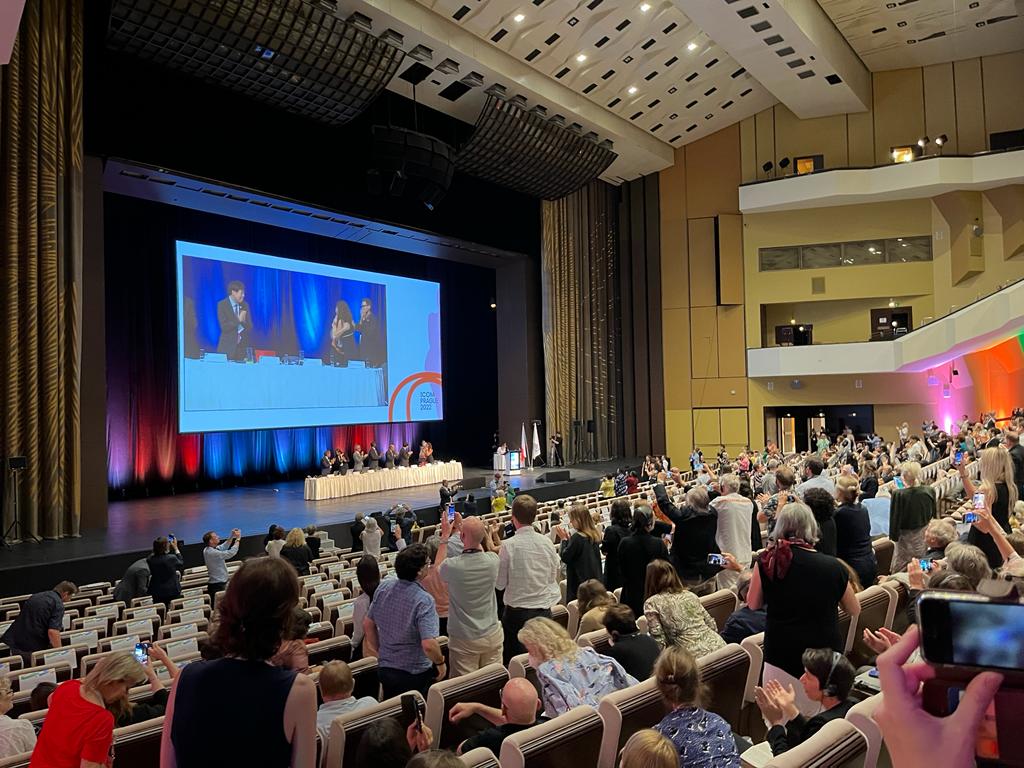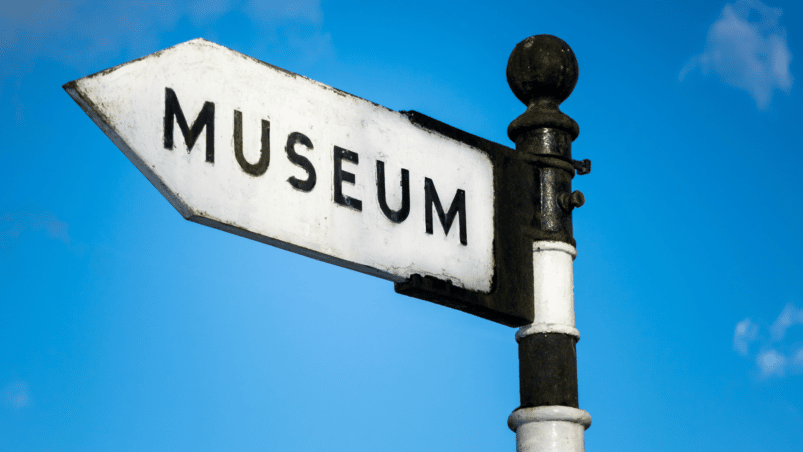Wednesday 24 August 2022 will go down in history as the day the international museum council ICOM voted ‘yes’ on a new definition of ‘museum’. At first sight a dry and technical question, but make no mistake: ICOM’s last meeting in 2019 ended in a heated debate over a controversial draft which eventually didn’t make the cut. The museum world has finally ended its ‘identity crisis’.
UPDATE 16:00
A whopping 487 members (92% of the total amount of votes) were in favour of the proposal. Many national committees reacted enthusiastically and were somewhat relieved by the adaptation. “This new definition is aligned with some of the major changes in the role of museums, recognising the importance of inclusivity, community participation and sustainability”, said ICOM president Alberto Garlandini in a response.
European Heritage Youth Ambassador Uula Neitola was present during the assembly and felt the definition is inclusive, focused on communities and diversity, and aligned with the Agenda 2030. As a Finnish national committee board member, he experienced the 18-month process from up close: “Personally I have found the consultation process fascinating. Producing a definition that encompasses the interests and values of all the museums worldwide is an enormous task to do.”
However, the assembly itself turned out a bit different than he expected. “I was mentally prepared for a bit more critical discussion from the floor”, Neitola told EHT. “But it seems that we have formed mutual understanding after a long, comprehensive and inclusive global consultation process. I’m happy with that.”

Last time out in Kyoto, the ICOM members – made up of experts and leading museums – showed clearly they were not happy with the proposal: more than 70% voted to postpone the decision on a new museum definition to the next general assembly. While Suay Aksoy, at the time ICOM president, called the postponement “one of the most democratic processes in the history of ICOM”, behind the scenes a lot of unrest and discontent brewed. So why were members unhappy with the 2019 proposal? And what can we expect of the new text, after a long consultation?
Definition vs. mission
The original definition of ‘museum’ has been largely the same since the foundation of ICOM in 1946. While the definition is not binding in a legal sense, it does have authority and plays an indirect role in legislation and allocating grants in many countries. However, “it doesn’t speak the language of the 21st century”, Jette Sondahl explained when she became chair of the ICOM Museum Definition, Prospects and Potentials committee (MDPP) in 2017.
One of the main issues of the definition proposed in 2019 was the addition of certain values to the factual description: being democratic, inclusive and polyphonic spaces, for example. Instead of being a society serving institute through conservation, research and exhibition, the 2019 definition formulated that museums should aim to “contribute to human dignity and social justice, global equality and planetary wellbeing.”
An important step to take a political stance, but also to protect museums in authoritarian countries, proponents such as Léontine Meijer-van Mensch from ICOM Netherlands argued. “We should have taken this step now, museums must dare to take a political stand in the current times”, she explained to Dutch newspaper NRC in 2019.
Current definition A museum is a non-profit, permanent institution in the service of society and its development, open to the public, which acquires, conserves, researches, communicates and exhibits the tangible and intangible heritage of humanity and its environment for the purposes of education, study and enjoyment. Definition rejected in 2019 Museums are democratising, inclusive and polyphonic spaces for critical dialogue about the pasts and the futures. Acknowledging and addressing the conflicts and challenges of the present, they hold artefacts and specimens in trust for society, safeguard diverse memories for future generations and guarantee equal rights and equal access to heritage for all people. Museums are not for profit. They are participatory and transparent, and work in active partnership with and for diverse communities to collect, preserve, research, interpret, exhibit, and enhance understandings of the world, aiming to contribute to human dignity and social justice, global equality and planetary wellbeing.
“This is not a definition, but a mission”, ICOM France president Juliette Raoul-Duval responded to the political message in the document. “The proposed text also contains a lot of words that we find difficult to understand: of course, we are ‘multi-voiced’ and ‘inclusive’, but what does that mean?” French professor François Mairesse, a former member of the MDPP, even characterized the text as ‘a statement of fashionable ideas’ in the Art Newspaper. “It does not take into account the extraordinary variety of museums. It would be disastrous to impose only one type of museum.”
After a chaotic debate, a motion to postpone the decision received an overwhelming majority of votes. Critiques about the ‘undemocratic’ consultation for the 2019 proposals were taken serious by setting up an extensive, four-round consultation, that would take eighteen months to complete. The 2019 proposal was eventually completely swepped of the table. So, what does the new text look like?
Hesitant enthusiasm
ICOM Netherlands will be represented in Prague by Amanda Vollenweider among others, and she expressed some hesitant enthusiasm about the vote: “We are quite enthusiastic about the text that is now presented”, Vollenweider told NRC last week. “We are going to vote in favour.” She expects that the new text (Proposal B) is ‘non-political’ enough to be adopted: “What I like about the new text”, said Vollenweider, “is that it contains the core tasks of museums; collection, conservation, research. But it also leaves room for the changing practices of museums.”
Whether other countries and members will appreciate the new proposal, is hard to predict according to Vollenweider: “However, the process has been so open, and everyone has had so many opportunities to get involved, that I suspect there will be a majority in favour.”
After the adaptation, the work is far from over. “Then we have to translate the text into Dutch, and you need to be thoughtful about every word, again”, Vollenweider predicts. “We will try to involve as many museums as possible because we have learned from this international process that openness works.”
Proposal A (rejected) A museum is a permanent, not-for-profit institution, accessible to the public and of service to society. It researches, collects, conserves, interprets and exhibits tangible and intangible cultural and natural heritage in a professional, ethical and sustainable manner for education, reflection and enjoyment. It operates and communicates in inclusive, diverse and participatory ways with communities and the public. Proposal B (opted for voting at ICOM Prague 2022) A museum is a not-for-profit, permanent institution in the service of society that researches, collects, conserves, interprets and exhibits tangible and intangible heritage. Open to the public, accessible and inclusive, museums foster diversity and sustainability. They operate and communicate ethically, professionally and with the participation of communities, offering varied experiences for education, enjoyment, reflection and knowledge sharing.
However, the adaptation of the new definition was not a clear-cut case. The British Museum Association mentioned that the ICOM advisory council’s vote between Proposal A and B was extremely close, implying that the issue is still controversial. Concerns were raised about the exclusion of “natural heritage” in Proposal B and describing museums as “permanent” and “not-for-profit” in both proposals.
Meanwhile, the American Alliance of Museums wanted more clarity on the use of the word “professionally” and the way that “not-for-profit” was translated into Spanish. Those concerns did eventually not become a deal breaker, as a whopping 92% voted in favour of the proposal.
Sources: Art Newspaper, ICOM, Museum Association, NRC 16-8-2022 (Dutch), NRC 8-9-2019 (Dutch)

